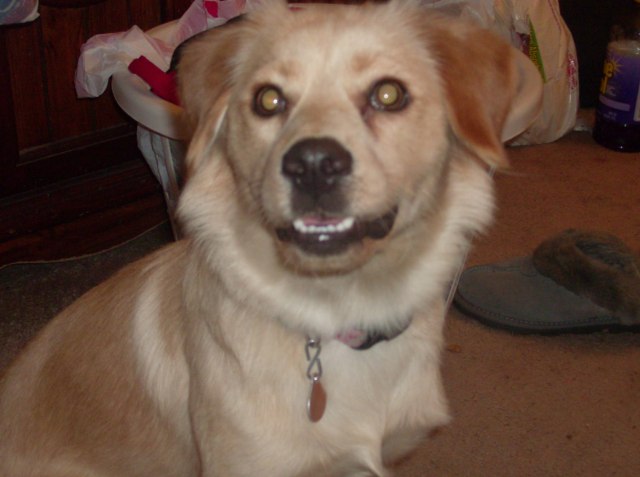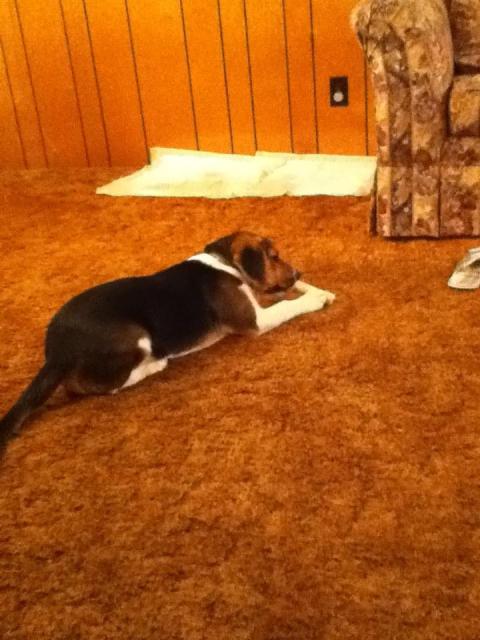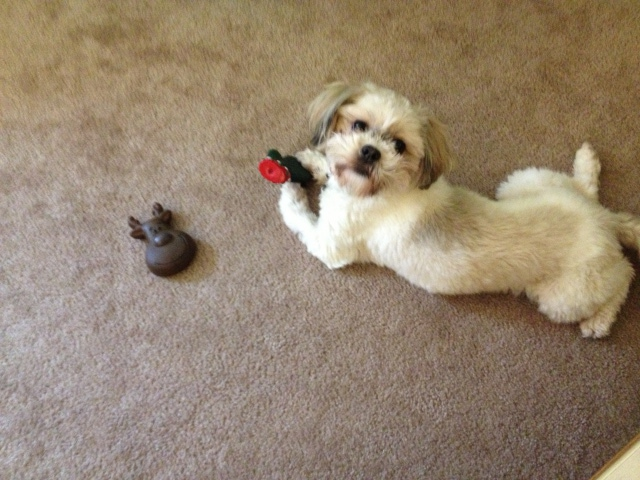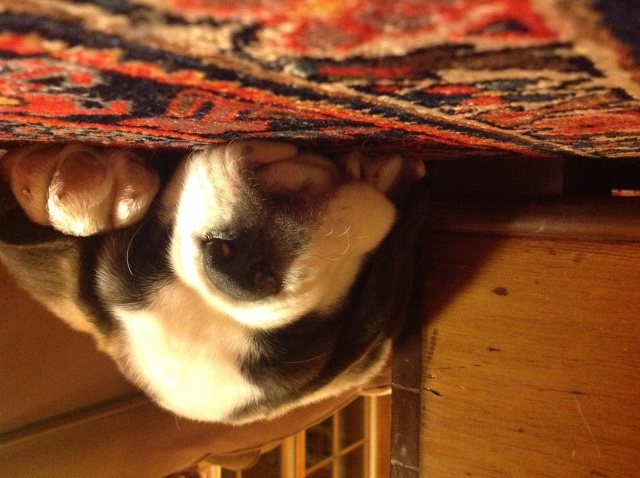QuestionHow do we stop aggressive violent attacks from our 2 yr old female weimar against our 12 yr old Chesapeak bay (also female)
These dogs have been together since the weimar was 8 wks old.
Up until 3 months ago they were best of friends, now Harriett attacks Rochester for moving near one of us (especially my partner Robert)....Harriett has caused some rather nasty gashes and tears in the chessies throat and ears....and Robert has been bitten twice while trying to break up the fights.
We have tried so hard to find what might be the triggers and what might be the underlying cause of these attacks and behavioral changes.
I try to give Harriett plenty of exercise...walks, runs, play, training sessions etc.
Can not figure out why she is so jealous of the Chessie, especially where Robert is concerned....as the attacks seem to happen more often when Robert is around the Chessie, or the Chessie moves as if to get close to Robert.
They continue to eat side by side and sleep next to each other with no real issues thus far.
However this morning with in seconds of the alarm going off we had to break up a fight again....Harriett just attacks, latching onto the throat of the chessie and won;t let go....
If we can not get a handle on this very very soon Harriett will either need to be put down or go up for adoption with the Weimar Rescue society
Please help us if you can
Mark Mead
AnswerI feel your pain. I had a Dobermand and a Rottweiler that were wonderful. One day I was in the house and they had gotten on the bed, along with a few of the cats and a couple beagles. Usually there was no problem and everyone got along. There are pictures of them in my book and DVD. Suddenly, a fight broke out between the two big dogs. I grabbed both of them by the collars, threw each in opposite directions, bellowed BAD DOG at teh top of my lungs. The Doberman hit one wall and left a dog shape hole int he drywall, and the Rott hit the dresser. Both look ed at me and slinked away. That one action, the only time in nearly 50 years of dog ownership, I had to show who was the undisputed pack leader and I would not stand for the fight.
Not I am not saying throw your dog through the wall. It just happened that way when my arms went out with a dog at each hand. It was one of those "my kids under the car, lift the car and drag them out" and figure out later you weren't strong enough usually to do that.
The point is, the humans have to be the undisputed pack leaders. That means the dogs must have had successful obedience training. We may never figure out what the trigger is for every agressive/dominant encounter. The important point is to resolve it quickly, decidedly, and enfore the pack leader rule. If the dog is attack a person, it is not seeing the person as a pack leader but a member of the pack. In wild life, the leader of the herd, pack, etc will be challenged by younger rivals for food, breeding, territory, "rights" to toys, affection, attention, and to re affirm the ranking order. This does not go away when we domesticate an animal.
Domestication establishes a inter-species ranking and relationship. I.e. if you milk me I'll come by when I need to empty my udder. I'll retreive the bird, rabbit etc when you kill it and we share the food because you feed me, house me, protect me etcetra. We have established a contractual relationship. We remove the animals need to forage for itself, fight for itself in exchange for the "work" it does for us which may range from carrying cargo to guarding our house or being our companion.
When we introduce a new member there are several stages of the relationship. Friend or foe, threat or just adolescent playing, attention/resources sharing, (food, bed, territory, affection, toys, etc. This is not a static relationship. As a puppy gets older, the older dog will at some point let the new comer know it is not interesting in playing, it wants to rest. Just as when we get older we get grouchy if we are interrupted, disturbed during activites or rest periods. We have adjusted to our surroundings to being familiar and unchanged and don't want the TV moved, don't want to part with an old sweater, chair etc.
From your explanation it seems you have a teen trying to be active with golden years who wants to be quiet, undisturbed, etc.
Possible solutions: keep the younger dog away from the older dog or insure they each have a private "do not disturb" space. Make sure the younger dog has been obedience trained. Make sure both dogs see the humans as the pack leaders who are in control. If the older dog has been relying on you to keep the peace, the younger dog has not and feels it is the boss. When you catch them in the moment, you need to be firm and decisive. While physical force is usually a last resort, it may be necessary. Scold the younger dog. (NO! BAD DOG! etc) Support the older dog as "pack leader" (it was there first) {Fido, are you OK? let me see your paw, ear, pet it, openly love it. You are sending the message to the younger dog, don't mess with Texas, I love chili!) Send the agressive dog to another area, room, where it can think about things (like a 4 yr old on "time out") When you bring them together again, make sure you show preferential to the older dog and "warn" the dog to be good or else. In terms of body language, I place myself between the dogs, with the agressive dog in front of me and the other behind me. I move toward the agressive dog, I invade its space, I make it back up, get out of my way, something we do as part of obedience training when we teach sit stay, if the dog moves, you back up the dog by moving toward it and invading its space. Become a bigger advisary than the dog it is fighting with. "You want a piece of this, Huh? I'll show you who's boss" is the attitude you must provide.
We had a beagle (died of natural causes at age 18) that liked to boss the other dogs especially two of our Doberman dogs. The Beagle was the Alpha dog, been our first dog after we got married, long before the others came home and many times over the watch dog of the house vs the Rotts, Dobs who were only interested in guarding the couch. One day the one Doberman got tired and turned around and got the beagle by the throat. Our German Short Hair pointer ran over, nipped the doberman on the leg, the doberman dropped the beagle and as far as the dogs were concerned that was the end of it. Meanwhile I had to rush the Beagle to the vet for large holes in its neck, fortunately it was only skin and fur and not vital muscles, veins, arteries, nerves. We had 20 dogs and 10 cats at the time. After the Beagle died our large long hair black and white cat (Philo T. Farnsworth) became Alpha Dog and remains so to this day.
I hope this helps. Our Obedience training book and DVD are $29 post paid US ZIP if you want to read more about behavior problems and training and do it yourself vs using a local professional trainer.

 Running/Non-Obeying
Question
Star
I have a female Lab mix who has this obse
Running/Non-Obeying
Question
Star
I have a female Lab mix who has this obse
 My dog just cant seem to get the hang of peeing or pooping outside.
Question
This is Trevor
Im a twin and I am a boy. My si
My dog just cant seem to get the hang of peeing or pooping outside.
Question
This is Trevor
Im a twin and I am a boy. My si
 Housebreaking My Puppy and Choosing the Right Fencing
Question
Woody
Hello. I have a four month old be
Housebreaking My Puppy and Choosing the Right Fencing
Question
Woody
Hello. I have a four month old be
 Chewing/Stealing
Question
Clarkie
my shih-tzu Clarkie is 21 month
Chewing/Stealing
Question
Clarkie
my shih-tzu Clarkie is 21 month
 puppy is shy - is this a deal breaker?
Question
Our baby!
Hi there - First of all, tha
puppy is shy - is this a deal breaker?
Question
Our baby!
Hi there - First of all, tha